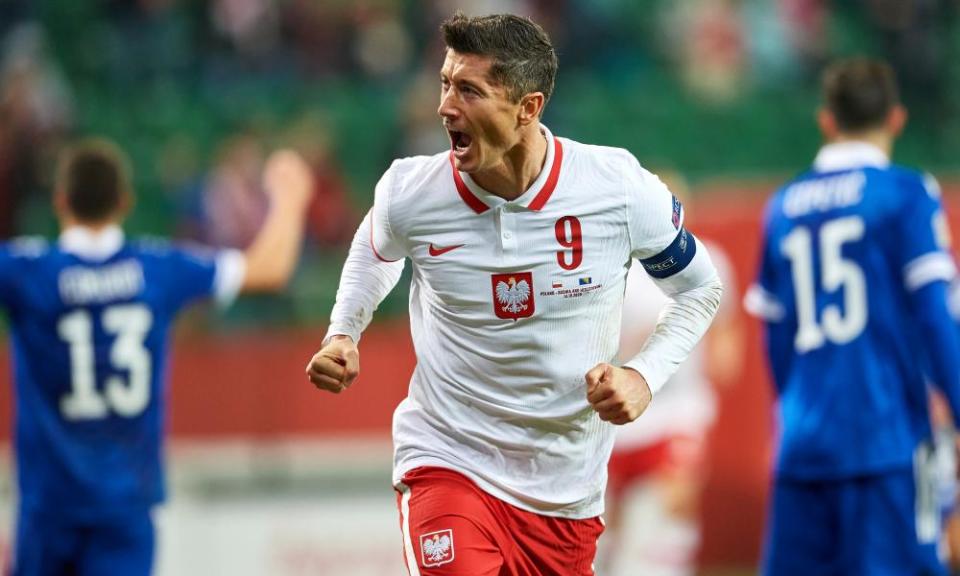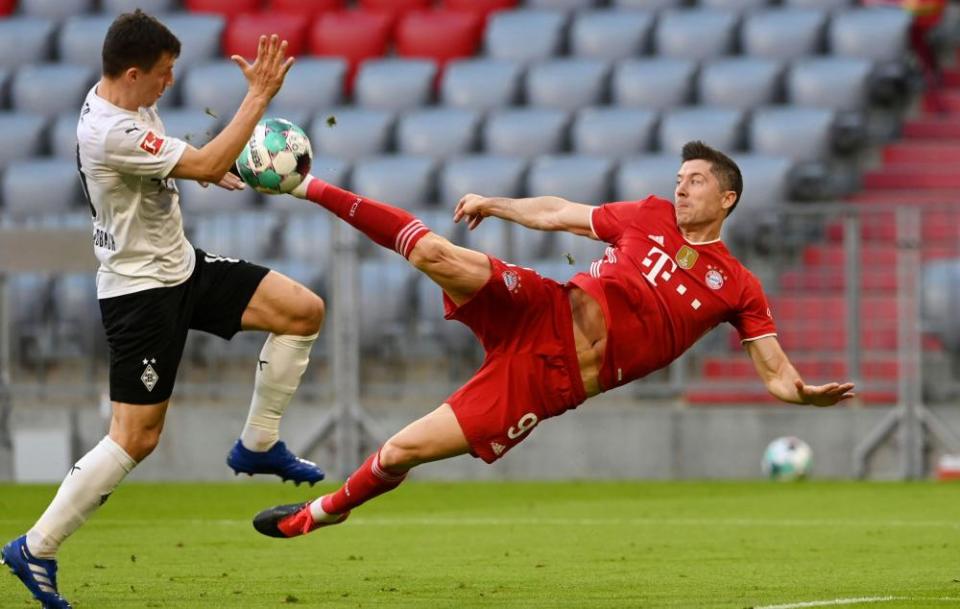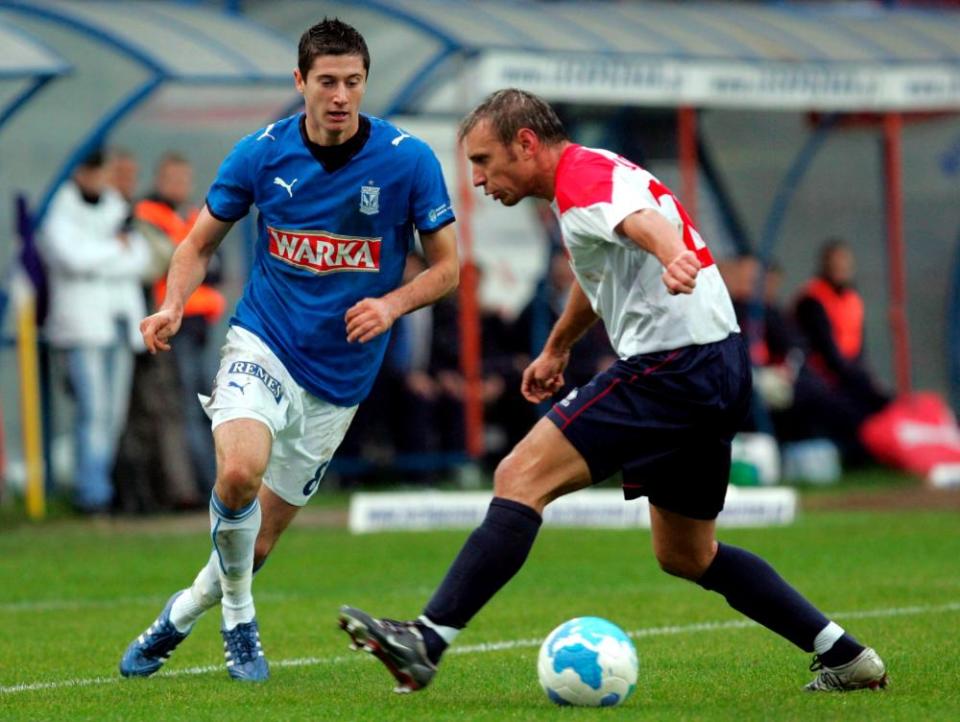‘Ineffective striker’: Lewandowski’s struggles on the road to glory

Daniel Kokosinski remembers walking off the pitch in a huff. In the summer of 2006 he was a defender for Znicz Pruszkow, building a career in Poland’s uncompromising third tier, but he knew a bit about finding the net. In a league often decided on set pieces, Kokosinski had recently finished as his team’s top scorer; now, in a friendly against Dolcan Zabki, he watched a new teammate miss an embarrassing number of chances and felt aghast.
“I was really angry,” he says. “I came to the coach and asked: ‘Who the hell is he? What an ineffective striker!’”
Related: ‘Not ideal but no excuse’: Spain’s Luis Enrique looks beyond Covid chaos
The centre-forward was Robert Lewandowski, although the name provoked little more than a shrug. Znicz had, in keeping with their policy of attempting to rehabilitate cast-offs, bought him from Legia Warsaw for £900 but early evidence suggested this particular project was too far gone.
“We went on to a training camp in Trzcianka,” Kokosinski says. “Robert was not fully healthy there; he was running very strangely. The coach saw it and wasn’t sure about him. Our chairman, Sylwiusz Mucha-Orlinski, said: ‘I take the responsibility on myself. If Robert is not good enough, I will pay for him from my own money.’”
It was the moment Lewandowski could have fallen through the cracks. Legia’s medical department had crudely deemed him too physically weak and he needed to shift that perception. But Mucha-Orlinski was never required to empty his pockets and, when Lewandowski leads out Poland against Slovakia on Monday on the back of a 48-goal season for Bayern Munich, there will be scant resemblance to the teenager who provoked such scepticism. “It’s totally different,” says Kamil Rylka, who had his own reasons to delight in Lewandowski’s transformation into the world’s most accomplished centre-forward. “He’s a machine.”
Rylka could not have been at closer quarters when, for all the splutters that would follow, the machine first clicked into gear. On 30 April 2005 he was a young goalkeeper playing for fourth-level KS Lomianki, on loan from Legia’s second team, against Delta Warsaw. He had heard of a forward called Lewandowski who was being given minutes off Delta’s bench: his flatmate Adrian Stepien, another Legia prospect, was close to the player. “I didn’t know how good he was, how good he could become,” Rylka says, but he soon received a taste that would make history.
“We were losing 1-0 at the break,” he says. “I remember walking out for the second half and some small kids behind my goal told me: ‘You’re going to concede three more.’ I replied: ‘Shut your mouths and get lost.’ In the end we lost 4-1 and, although I didn’t know it until afterwards, Lewandowski scored one of the goals.
“I’d be lying if I said I could describe it clearly. But I think he came into the box and used one or two touches, a really quick finish.”
It was the 16-year-old’s first senior goal and, in conceding it, Rylka’s place in the record books. Rylka indirectly helped in a different way, too: the Legia scout sent to watch his progress was enamoured of Lewandowski, who had been loosely on their radar for months, and a contract with the country’s biggest club followed within weeks.
Rylka and Lewandowski were now reserve-team colleagues and Lewandowski became a frequent visitor to the apartment Rylka shared with Stepien. “Adrian invited him quite often and we’d play on the PlayStation, or go and play football-tennis,” Rylka says. “Robert was really calm, really self-confident in everything he did. Even when he wasn’t getting into the team, he was always smiling and laughing. I felt he was enjoying himself.”
Any other state of mind would have made what quickly became an ordeal at Legia weigh more heavily. Rylka recalls that, on the pitch, Lewandowski simply did not fit in. “They wanted a strong, fast striker who would run into space,” he says. “He was not so fast or strong, really tiny, and running in a way nobody would expect of a top footballer. But as a goalkeeper I knew what he did have: most players would just see the goal and want to shoot as hard as they could but Robert was totally different. He was always finding the spaces, finding the angles, shooting lightly but more precisely.”
That was not sufficient for Legia. Lewandowski had ankle problems and Legia “judged him very negatively very quickly”. His teammates learned of his departure for Znicz, after a solitary season that brought four goals, when he did not turn up for Legia reserves’ pre-season camp and Rylka felt they might regret their haste.
“Robert was really motivated, really dedicated,” he says. “I knew sooner or later he’d get an opportunity and it was up to him if he would take it. He had huge motivation to show they made a mistake.”
Once Kokosinski got to know Lewandowski, a pleasant but quiet figure in the Znicz dressing room, and appreciated that he worked “like a titan”. In those early weeks at Znicz he would stay behind for individual training and sneak in extra match practice by turning out for Partyzant Leszno, the tiny club where he had taken his first footballing steps, under a pseudonym. An injury to another striker, Daniel Wojtulewicz, gave him a chance to silence any criticism. He exploded: 15 goals and promotion followed; Lewandowski had topped the scoring charts from nowhere but endured a mixed start to 2007-08 in the second division.
“People saw bigger potential in Bartek Wisniewski,” Kokosinski says. “Bartek was older than Robert and played more often: he scored more beautiful goals and was a more spectacular player, so ‘Lewy’ was No 2.” Wisniewski left for Wisla Plock midway through the season and now Jacek Grembocki, who became Znicz’s manager in the same period, could build a side around Lewandowski.
“It was a breakthrough moment for Robert,” Kokosinski says. “He became the best No 9 in the team and responsibility for scoring goals fell on one player, not two. We played 4-2-3-1, not 4-4-2, and it was the time of Lewy’s biggest development. He became the real leader of the team. When a rival dominated us, he could turn the tide of a match and won a few games for us on his own.”

Znicz fell just short of a remarkable ascent to the Ekstraklasa, Poland’s highest level; Lewandowski finished the season with 21 goals, leading the charts again, and was operating on a different plane to many of his teammates.
“I played alongside Robert once when Tomek Feliksiak, the No 10, was injured and the ball was always landing next to him, never to me,” says Adrian Paluchowski, who arrived on loan from Legia but could not unseat Lewandowski. These days Paluchowski plays for lowly Wisla Pulawy. “We were similar players,” he says. “I think the biggest difference was mental. At the time we were players on a comparable level, but Robert was stronger mentally and probably had bigger persistence in striving for a goal. I think that is why he is the best striker in the world and I play in the fourth league in Poland.”
Lewandowski stepped up to Lech Poznan in June 2008 and, two years later, moved to Borussia Dortmund. The rest is history and those who saw him toil, in the best of humour, through those moments of uncertainty and ridicule will experience familiar pride as he attempts an unlikely Euro 2020 heist with Poland.

“I feel lucky to be part of his career in some way, because I was the one he scored his first goal against and then conceded and saved his shots in training for a year,” says Rylka, a goalkeeper coach at the Norwegian club FK Haugesund.
“So in some way I had an impact on Robert’s path. But when I look at him I still see the same guy. Of course he’s like a Hollywood star now, but I really see the kid I knew.”
For Kokosinski, that fit of rage upon seeing Lewandowski fluff his lines could not seem further away. “I knew he could make a great career but, honestly, I did not expect he would become one of the best footballers in the world,” he says.
“When I watch him now, I’m very happy I was able to play with him. I look through photo albums and see pictures with a young Robert, and nobody can take that away from me. I can watch a Champions League final and see my colleague, and I’m not jealous in the least. As a person, not only as a footballer, Robert has deserved it all.”
Additional reporting by Emil Kopanski.

 Yahoo Sport
Yahoo Sport 





































